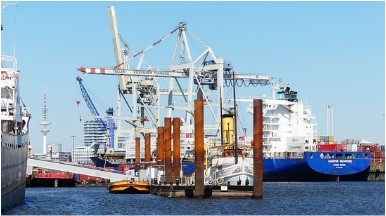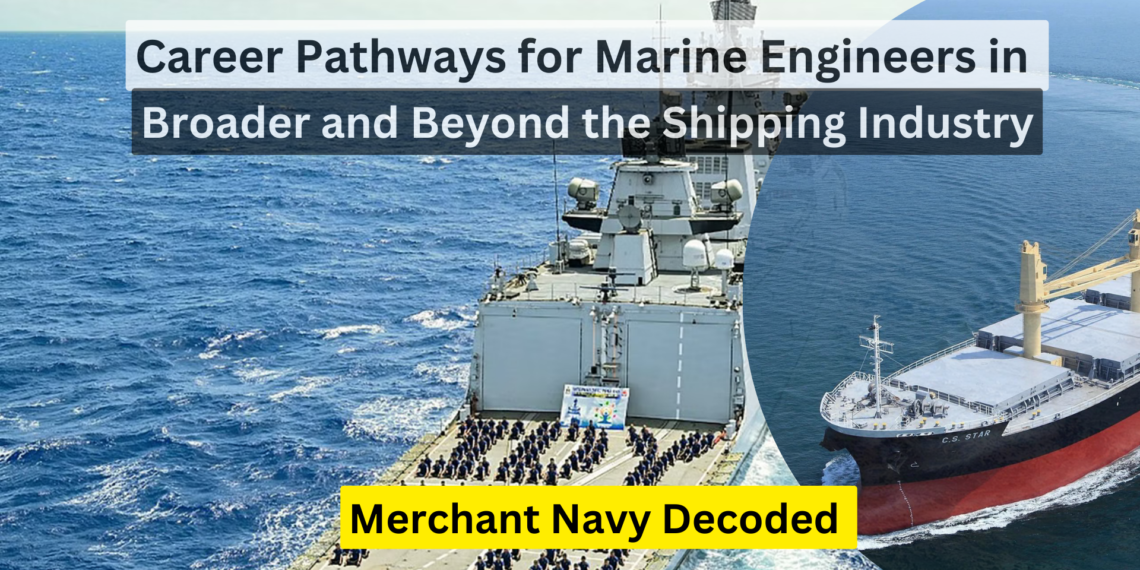Career Pathways for Marine Engineers in Broader and Beyond the Shipping Industry
Overview:
- Marine Engineers’ Versatile Careers: Uncover diverse career paths for marine engineers within and beyond the shipping industry.
- Key Roles Explored: Learn about opportunities in ship brokering, port operations, maritime law, and more.
- Beyond the Sea: Discover how marine engineers can excel in roles in hospitality, IT, and logistics, leveraging their skills for new horizons.
If you want to check out the options available for marine engineers in Core Shipping then CLICK HERE.
A Short Insights Into Beyond And Broader Maritime Shipping Industry

Broader maritime shipping
- It typically refers to the core activities and services directly related to the shipping industry.
- This includes activities like shipbuilding, ship operation, port management, cargo handling, and maritime law that are directly involved in the transportation of goods and passengers via ships.
On beyond shipping
- Beyond shipping in this context refers to career opportunities and roles that are not directly tied to the core maritime shipping industry but are still accessible and attractive to individuals with a background in marine engineering.
- These could include careers in hospitality, IT, logistics, legal services, or other fields where the skills and knowledge acquired in the maritime industry can be valuable and transferable. It essentially means exploring career options outside the traditional scope of the maritime shipping industry.
Career Opportunities For Operational level engineers in Broader Maritime Industry
Ship Broker
- Facilitating Transactions: Ship brokers act as intermediaries, connecting shipowners with charterers or buyers, streamlining the complex process of buying, selling, or chartering vessels.
- Market Insight: They provide market insights, helping clients make informed decisions on pricing, routes, and market conditions, which is crucial for profitable shipping operations.
Port Operations
- Efficient Cargo Handling: Port operations professionals ensure efficient cargo loading and unloading, minimising vessel turnaround times, and optimising port resources.
- Safety and Compliance: They play a key role in maintaining safety and compliance with international regulations, including overseeing the safe mooring and departure of vessels.
Maritime Lawyer
- Legal Expertise: Maritime lawyers bring their in-depth knowledge of maritime law to address issues like contract disputes, accidents, environmental regulations, and international trade laws.
- Negotiation and Dispute Resolution: They negotiate on behalf of clients and are skilled in dispute resolution, making sure that legal matters are resolved favourably.
Business Development
- Market Analysis: Professionals in business development analyse market trends and identify opportunities, helping shipping companies expand their services.
- Strategic Partnerships: They play a crucial role in forming strategic partnerships and collaborations, which can be essential for business growth in the shipping industry.
Machinery Surveyor
- Mechanical Inspections: Machinery surveyors specialise in inspecting and evaluating the condition of machinery on ships and other marine installations, ensuring they are in proper working order.
- Maintenance and Compliance: They play a critical role in ensuring that all onboard machinery and equipment comply with safety standards, and they often provide maintenance recommendations to ensure optimal functionality and safety.
Ship Charter
- Chartering Services: Professionals in ship chartering assist in securing vessels for cargo transportation, either as brokers connecting charterers with shipowners or as operators within a shipping company responsible for the chartering process.
- Contract Negotiation: They negotiate charter agreements, specifying terms, routes, and cargo details. Ship charter professionals also ensure the vessels are well-maintained and adhere to safety and environmental standards throughout the charter period.
Shipyard
- Maintenance and Repair: Operational engineers in shipyards oversee vessel maintenance, repair, and overhaul projects, ensuring ships are in prime condition for safe and efficient operations.
- Construction Management: They contribute to ship construction projects, managing various aspects of shipbuilding, including quality control and adherence to specifications.
Exploring Broader Maritime Shipping Options For Management Level Marine Engineers
- Management level engineers bring enhanced value to the maritime industry due to their adaptness in management, technical expertise, and analytical skills.
- Their proficiency enables them to seamlessly transition into roles typically held by operational level engineers. When they pursue these positions, they often find themselves preferred for higher-ranking roles and more lucrative salary packages.
- While the initial salary might not match what they earned at sea, the potential for career advancement and income growth is substantial.
Furthermore, in addition to the options discussed earlier, there are several other job opportunities available in the broader maritime industry for management level engineers.
Commercial Shipping Chartering and Brokering
- Strategic Fleet Management: Lead teams in optimising vessel charters, negotiate contracts, and strategically manage the fleet to ensure efficient operations and profitability.
- Market Analysis and Forecasting: Use industry insights to make informed decisions, forecasting market trends and identifying lucrative chartering opportunities.
Auditing of Cargo Handling Facilities
- Quality Control and Compliance: Oversee the audit and inspection process of cargo handling facilities to ensure compliance with safety and quality standards.
- Operational Efficiency:Implement process improvements and safety measures to enhance the efficiency of cargo handling operations, reducing delays and costs.
Plant Maintenance System
- Asset Reliability: Develop and manage maintenance programs to maximise the reliability of vessels, onboard equipment, and infrastructure.
- Cost Management:Balance maintenance costs while ensuring optimal performance and longevity of assets.
Maritime Project Management
- Project Execution:Coordinate shipyard projects, vessel construction, and repairs, ensuring projects are completed on time and within budget.
- Stakeholder Communication:Effectively communicate with various stakeholders, including shipyard teams, regulatory bodies, and clients, to ensure project success.
Maritime Logistics and Supply Chain Management
- Supply Chain Optimization: Manage the logistics and supply chain operations, streamlining the movement of goods and ensuring timely deliveries.
- Cost Reduction: Identify cost-saving opportunities within the supply chain and logistics processes.
Maritime Law
- Legal Compliance:Specialise in maritime law, ensuring that all aspects of shipping operations adhere to local and international regulations.
- Contract Negotiation and Dispute Resolution:Negotiate contracts and assist in resolving legal disputes involving shipping and maritime matters.
Beyond the shipping horizons: Exploring Career Opportunities for Management and Operational Level Engineers
Hospitality Industry
- Machinery Maintenance in Hotels: Operational engineers can find opportunities in the hospitality industry, focusing on maintaining and servicing machinery within hotels and cruise ships, ensuring guest comfort and safety.
- Cruise Line Employment: Operational engineers can work on cruise ships, overseeing the operation and maintenance of ship systems, enhancing the guest experience while voyaging to exotic destinations.
Logistics Company
- Supply Chain Optimization: In logistics companies, operational engineers can excel in roles that involve overseeing supply chain and transportation operations, streamlining processes, and ensuring efficient movement of goods.
- Logistics Manager: They can take on roles as logistics managers, responsible for coordinating the logistics of shipments, optimising routes, and managing resources for the timely delivery of goods.
Product Management in IT Company
- Leveraging Analytical Skills: Operational engineers can transition to product management roles in IT companies, where their analytical skills and technical background can be used to develop and manage software products. They play a crucial role in defining product features, gathering user feedback, and ensuring the product meets market demands.
- Bridge Between Tech and Business: As product managers, they act as a bridge between the technical development teams and the business side of the company, aligning the product roadmap with strategic goals.
Program Manager
- Project Oversight: Operational engineers can pivot to program management, where they oversee multiple projects, ensuring they are on schedule, within budget, and aligned with organisational objectives.
- Resource Allocation: Program managers are responsible for resource allocation, risk assessment, and ensuring that projects are executed efficiently, making this role an ideal fit for individuals with a background in managing complex operations.
Coding (Data Scientist)
- Data-Driven Decision Making: Transitioning into data science or coding roles, operational engineers can leverage their analytical and problem-solving skills to work with large datasets, extract insights, and make data-driven decisions.
- Machine Learning and Analytics: They can apply machine learning and statistical analysis to solve complex problems, contributing to areas like predictive maintenance, logistics optimization, and more, particularly in fields where data analysis is critical.
Conclusion

In conclusion, we’ve explored the exciting world of career possibilities for marine engineers. From the heart of the shipping industry to diverse opportunities beyond the sea, there’s a wide horizon waiting to be explored. But the journey doesn’t end here! In our upcoming blog, we’ll be diving into the career options for deck officers. So, stay tuned for more exciting insights into their adventures in the core, broader, and beyond the shipping industry! Get ready to go Onshore with us!
Disclaimer :- The opinions expressed in this article belong solely to the author and may not necessarily reflect those of Merchant Navy Decoded. We cannot guarantee the accuracy of the information provided and disclaim any responsibility for it. Data and visuals used are sourced from publicly available information and may not be authenticated by any regulatory body. Reviews and comments appearing on our blogs represent the opinions of individuals and do not necessarily reflect the views of Merchant Navy Decoded. We are not responsible for any loss or damage resulting from reliance on these reviews or comments.
Reproduction, copying, sharing, or use of the article or images in any form is strictly prohibited without prior permission from both the author and Merchant Navy Decoded.


